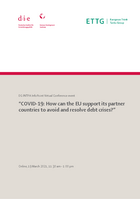How can the EU support its partner countries to avoid and resolve debt crises?
Veranstaltungsart
Virtual Conference
Ort / Datum
Online, 19.03.2021
European Think Tanks Group (ETTG) in cooperation with DG INTPA
Many developing countries will not find their way out of the COVID-19 crisis on their own, and in addition to the direct public health and economic implications face both immediate and medium-term fiscal challenges. As long-standing providers of concessional finance and direct investment to developing countries, the international community and particularly the economically stronger countries such as the European Union member states have a shared responsibility to support these countries.
The European Union recognises this responsibility and on 30 November 2020 adopted Council Conclusions in which it committed to furthering international debt restructuring and relief efforts for African countries. The EU has also committed to participate in the “Debt Service Suspension Initiative” (DSSI), recognised that developing countries with unsustainable debt levels need debt treatments beyond the DSSI and has welcomed the G20 and Paris Club agreement on the “Common Framework for Debt Treatments beyond the DSSI”. In addition, the EU decided to contribute €183 million to the IMF’s Catastrophe Containment and Relief Trust (CCRT) for debt relief in low-income countries (LICs). Yet these measures are not sufficient to avoid and resolve debt crises in developing countries.
As European Think Tanks Group network we facilitate this dialogue in cooperation with DG INTPA because we want to encourage discussions on how the European Union and its member states can contribute to preventing and resolving debt crises in developing countries in the course of the COVID-19 crisis.
- What are the main reasons for the high debt levels in developing countries?
- How has the COVID-19 crisis exacerbated the debt situation in developing countries?
- How can the EU contribute to solve short- and medium-term liquidity problems in developing countries?
- How can the EU contribute to building up long-term instruments for preventing debt crises in developing countries?
- How can the EU ensure that debt treatments are linked to sustainable development?
Panel
- Thomas Feige, Head of Sector, Unit E1 – Macro-economic analysis, fiscal policies and budget support, DG INTPA, European Commission
- Peter Kovacs, Policy Officer, Unit E1 – Macro-economic analysis, fiscal policies and budget support, DG INTPA
- Kathrin Berensmann, Senior Research Fellow and Project Head, German Development Institute / Deutsches Institut für Entwicklungspolitik (DIE)
- Shakira Mustapha, Research Fellow, Development and Public Finance, Overseas Development Institute, (ODI)
Hinweis
Während unserer Veranstaltungen werden z.T. Foto- und/oder Filmaufnahmen gemacht, die für Zwecke der Veranstaltungsberichterstattung und allgemeinen Öffentlichkeitsarbeit in verschiedenen Medien veröffentlicht werden. Sie haben jederzeit das Recht, die Foto- oder Videograf*innen darauf hinzuweisen, dass Sie nicht aufgenommen werden möchten. / During our events photos and/or videos may be taken which may be published in various media for the purposes of documentation and PR activities. You have the right at any time to point out to the photographer or videographer that you do not want to be photographed or filmed.
Veranstaltungsinformation
Datum / Uhrzeit19.03.2021 / 11:30 - 13:00
OrtOnline


